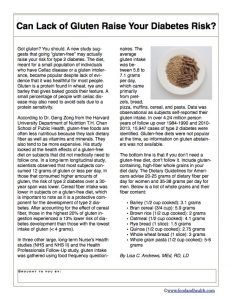Can a Lack of Gluten Raise Your Diabetes Risk?
Got gluten? You should. A new study suggests that going “gluten-free” may actually raise your risk for type 2 diabetes. The diet, meant for a small population of individuals who have Celiac disease or a gluten intolerance, became popular despite lack of evidence that it was healthful for most people. Gluten is a protein found in wheat, rye and barley that gives baked goods their texture. A small percentage of people with celiac disease may also need to avoid oats due to a protein sensitivity.According to Dr. Geng Zong from the Harvard University Department of Nutrition T.H. Chan School of Public Health, gluten-free foods are often less nutritious because they lack dietary fiber as well as vitamins and minerals. They also tend to be more expensive. His study looked at the health effects of a gluten-free diet on subjects that did not medically need to follow one. In a long-term longitudinal study, scientists observed that most subjects consumed 12 grams of gluten or less per day. In those that consumed higher amounts of gluten, the risk of type 2 diabetes over a 30-year span was lower. Cereal fiber intake was lower in subjects on a gluten-free diet, which is important to note as it is a protective component for the development of type 2 diabetes. After accounting for the effect of cereal fiber, those in the highest 20% of gluten ingestion experienced a 13% lower risk of diabetes development than those with the lowest intake of gluten (< 4 grams).In three other large, long-term Nurse’s Health studies (NHS and NHS II) and the Health Professionals Follow-Up study, gluten intake was gathered using food frequency questionnaires. The average gluten intake was between 5.8 to 7.1 grams per day, which came primarily from pretzels, bread, pizza, muffins, cereal, and pasta. Data was observational as subjects self-reported their gluten intake. In over 4.24 million person years of follow up over 1984-1990 and 2010-2013, 15,947 cases of type 2 diabetes were identified. Gluten-free diets were not popular at the time, so information on gluten abstainers was not available.The bottom line is that if you don’t need a gluten-free diet, don’t follow it. Include gluten-containing, high-fiber whole grains in your diet daily. The Dietary Guidelines for Americans advise 20-25 grams of dietary fiber per day for women and 35-38 grams per day for men. Below is a list of whole grains and their fiber content:
- Barley (1/2 cup cooked): 3.1 grams
- Bran cereal (3/4 cup): 5.9 grams
- Brown rice (1/2 cup cooked): 2 grams
- Oatmeal (1/2 cup cooked): 4.1 grams
- Rye bread (1 slice): 1.5 grams
- Quinoa (1/2 cup cooked): 2.75 grams
- Whole wheat bread (1 slice): 3 grams
- Whole grain pasta (1/2 cup cooked): 5-6 grams
By Lisa C. Andrews, MEd, RD, LDReferences:
- Geng Zong, Ph.D., research fellow, department of nutrition, Harvard T.H. Chan School of Public Health, Boston; Lauri Wright, Ph.D., R.D.N., spokesperson, Academy of Nutrition and Dietetics, and director, doctorate in clinical nutrition program, University of North Florida, Jacksonville; March 9, 2017 presentation, American Heart Association Epidemiology and Prevention/Lifestyle and Cardiometabolic Health 2017 Scientific Sessions, Portland, Ore.
- Geng Zong, Benjamin Lebwohl, Frank Hu, Laura Sampson, Lauren Dougherty, Walter Willett, Andrew Chan, Qi Sun. Associations of Gluten Intake With Type 2 Diabetes Risk and Weight Gain in Three Large Prospective Cohort Studies of US Men and Women. Circulation. 2017;135:A11
- Ardisson Korat AV1, Willett WC2, Hu FB2. Diet, lifestyle, and genetic risk factors for type 2 diabetes: a review from the Nurses' Health Study, Nurses' Health Study 2, and Health Professionals' Follow-up Study. Curr Nutr Rep. 2014 Dec 1;3(4):345-354.

